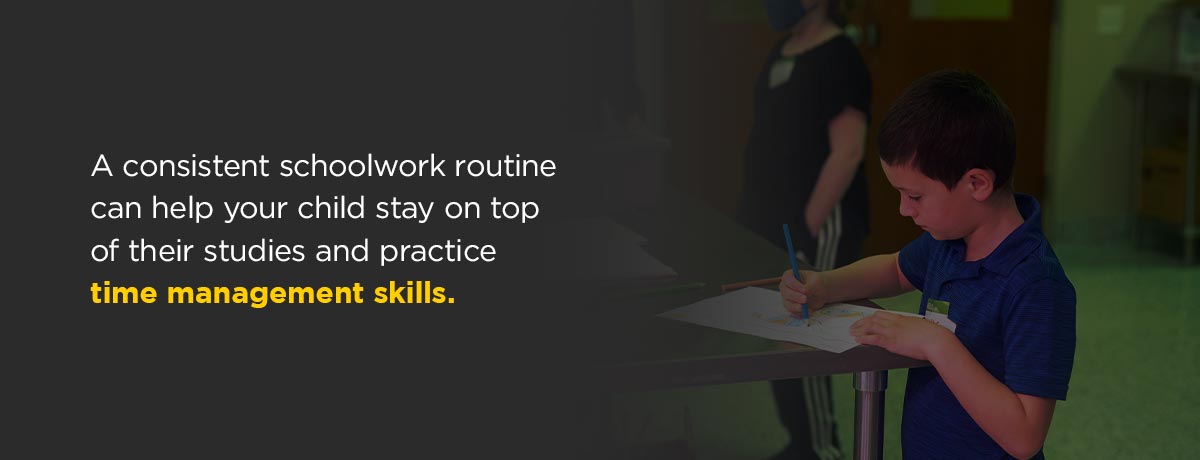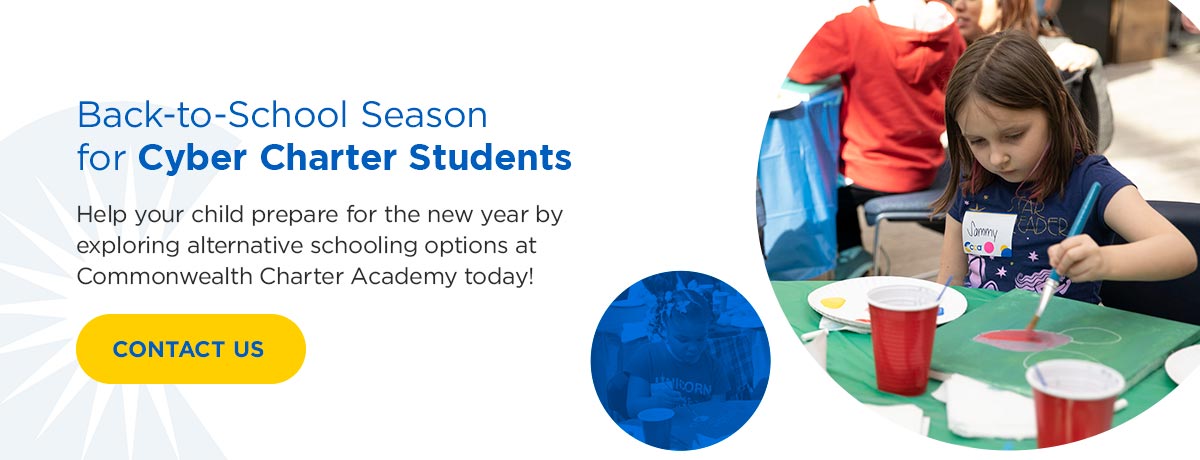Tips on preparing your family for the back-to-school schedule
Every year, just as summer starts to wane, the signs of back-to-school season appear. Store shelves overflow with notebooks, pencils, and lunchboxes. Teachers are sending their back-to-school lists. You’re excited about all the upcoming events in the fall, from sports to band camps and school plays.
Is your child excited? Or worried? It’s probably both. How your student enters the first few days of school can set the tone for the rest of the year. This is a time for managing expectations, calming fears and settling your child into good habits and routines that make the school year a success. These back-to-school tips can help families manage the transition with ease this year and the many to come.
Why Preparing for the New School Year Matters
Ever jump into the deep end of the pool, only to surface disoriented and shivering?
It’s the same feeling for kids who’ve been enjoying lazy summer days. Suddenly, they’re dunked into the daily grind of school. If they weren’t preparing for back to school, they could have a slow start because their minds weren’t set to learning mode. Their worries about a new school year can cause concentration to slip.
Even children who look forward to learning new things and reconnecting with friends can feel anxious about the challenges ahead. Will they fit in? Will their classmates like them? Will they get good grades? Will they like their teachers? If your child is entering a new school, these concerns can be doubly worrisome.
All that anxiety can get in the way of your child’s academics, especially in those crucial first weeks of school, when the groundwork is laid for all the learning to come. Instead of diving into the deep water, try inching into the shallow end. Establish a schedule that instills healthy routines and realistic expectations before the big day, and your child will be confident and ready to make a splash this school year.
12 Important Back-to-School Tips for Online Learning
Parents wondering how to make it easier to go back to school don’t have to flounder. A few simple steps can transition kids into new expectations and prepare them for success throughout the school year. A bit of planning can boost your child’s confidence, prevent unpleasant surprises, and put your child in a learning mindset.
1. Set a New Schedule
A key factor in how to get organized for school is creating a schedule. Routines and regular schoolwork times give children a sense of structure, make them feel safe and ready to tackle new challenges and tasks, and teach them self-control skills.
Think about what will be expected of your child and you. Map out the parts of each day that you know will come, including the all-important morning routine and daily schoolwork times. By taking into account the flow of your day and making a schedule that works for you and your learner, you can establish routines that help your child feel comfortable and thrive.
2. Stock up on School Supplies
Back-to-school shopping can be an exciting time for your child to get ready for the upcoming year. Finding all the school supplies your child needs to succeed can help them feel prepared for their first day and the rest of the year.
School supplies your child may need include:
- Pencils, highlighters, and pens
- Notebooks and folders or a binder
- Calculator
- Ruler
- Markers, crayons, or colored pencils
- Index cards and sticky notes
- Hand sanitizer
- Glue sticks
- Backpack
- Lunch box
- Pencil case
- Planner
- Textbook covers
Some teachers may require a list of school materials, and you should always check class documents to ensure your child has the supplies they need. Whether your child is walking into the classroom or logging in online, having their supplies well in advance will get them thinking about school and help them feel more prepared for the upcoming assignments.
3. Plan for the Week Ahead
Planning diminishes family stress and saves time in the long run. When children know what to expect, they’re equipped with the coping skills to adapt as new challenges and situations emerge. Start with a schedule for the first full week of schoolso you face each day knowing what to expect. Mapping out the week’s school supplies, meals and outfits puts everything at hand when you need it.
Preparing meals can significantly impact your student’s success. Ensure they start their mornings with a healthy breakfast to help them stay focused through the morning. Prepare for their midday lunch by stocking your kitchen with healthy options that will aid in getting them through the day.
Planning or preparing lunches in advance can make it easier for your child to resist snacking throughout the school day or reaching for a quick meal instead of a healthy one. When your child knows there’s a filling lunch waiting for them, they will be less likely to overeat or snack as they work through their studies, keeping them full of wholesome foods that increase their productivity.
Get into the habit of updating the plan every week. Looking at it with fresh eyes helps you carve out more time for events that fall outside the ordinary, such as preparing for a dance recital or a big game. Add it all into your schedule, using a school planner or your own system.
4. Give Incentives for Good Habits
One big difference between summer and the school year is the need to set goals. Just as lifting weights builds muscle, goal setting gets stronger with practice.
A new school year is the perfect time to get started. Begin by setting realistic goals with your child. Then, create a rewards system that provides motivation and reinforces good habits. The promise of lunch at a favorite restaurant, a new book or video game, or a movie rental could be the push your learner needs to meet deadlines on projects, study for tests or make gains in areas where they struggle.
5. Attend Field Trips
Early in the school year, take your child on a field trip as a reminder that real-world learning encompasses all the fun of a summertime adventure. Field trips offer education that transcends books and lessons. They sustain motivation, give learners hands-on experience and offer opportunities to practice newfound skills outside the classroom.
CCA offers more than 900 field trips throughout the year and across the state to enhance the lessons that students learn in the virtual classroom. It might be an enlightening visit to the past via a Pennsylvania historical site, a close-up encounter with wildlife or a social field trip where children forge new friendships between trampoline bounces.
6. Use Your Family Mentor
At CCA, no family is alone. Back-to-school time, and the entire school year, is less stressful with guidance and kind words from a family mentor. Our family mentors are veteran CCA parents who help our newly enrolled and emerging families adjust to online learning.
Family mentors know your questions even before you ask thembecause they’ve been in your shoes. They can offer advice on the nuts and bolts of online learning, from how to monitor learning growth to how to juggle the schedules of sibling learners. Contact a family mentor for support. Our mentors make themselves available by phone, in person, and virtually, as they strive to help every family succeed and find useful resources.
7. Create a Distraction-Free Zone
Online learning offers many advantages. Children study at their own pace. They make their own friends. They pursue their personal passions.
Of course, online learning turns the home into a classroom, and homes are full of distractions. Games, pets, and siblings beckon with the temptation of fun and playtime.
Parents can minimize the distractions that sidetrack concentration. Designate and organize a space meant just for learning. Take away the tablets, smartphones, and TVs. Establish quiet hours. Help your child get into the habit of tidying up the learning space. Keep healthy snacks at hand, shooing away hunger pangs with fruits, vegetables and protein-rich noshes such as Greek yogurt.

8. Develop Good Study Habits
A consistent schoolwork routine can help your child stay on top of their studies and practice time management skills. Good study habits help new information find a permanent place in the brain. A bit of study each day, even when evenings are still light and warm, eases children into the schoolwork mindset and establishes good habits for the rest of the year.
Some tips for creating good study habits and building a study routine include:
- Teach your child to stop and review the main ideas at the end of each page they study.
- Learn a little bit of information from multiple subjects every day.
- Encourage breaks to give overtaxed parts of the brain a rest while other parts step up to help solve the problem.
- Start routine building by introducing five or 10 minutes of study daily and gradually increasing to a goal.
- Supervise your child’s internet and device use to ensure they stay on task.
- Discuss ways to overcome barriers with instructors if your child is struggling with a subject or material.
- Make yourself available for questions when your child is completing their work.
- Build schoolwork time into your child’s routine, so they know what to expect and can plan around other activities.
- Help your student stay organized by investing in school supplies to keep track of assignments, deadlines, and schedules.
9. Watch for Signs of Stress
Whether your child is in a traditional brick-and-mortar institution or seeking personalized education online, school can be a stressor for many students, and stress can show in many different forms.
Changes in sleeping or eating patterns, isolation, an inability to focus, changes in behavior and mood, and increased focus on illnesses can all be signs of academic stress. Students who begin to stress about school may want to withdraw from their work by staying home, leaving assignments incomplete, or avoiding their schoolwork altogether by engaging in other tasks.
It’s vital that you monitor your child’s mental health and seek support when necessary. Communicating with your child about their needs and what you can do to ease their stress will aid in their coping and give them the care and attention they require. Teachers and school counselors can guide your student to resources and academic support while they get back on track. If your child needs additional support, contact their primary care provider.
10. Use a School Planner
For children, poor planning can lead to bad gradesdue to lost opportunities to study for tests or penalties imposed on late assignments. Whether you use an app or a paper planner, planning is essential.
The important thing is making entries a part of the daily routine. Teach your child to fill in assignment due dates as soon as they’re set. Use “backward planning,” too, with reminders of important deadlines days or weeks in advance. Use the planner for school-related assignments and events, but keep the big picture in mind by entering everything else, too — parties, trips, appointments. Keep everything you’ve entered in the planner, including teachers’ contact information and reading lists, for future reference.
Making to-do lists can keep your child organized and help them understand how to prioritize their tasks. Giving your child a way to track their day and crossing off items as they go can keep them engaged and productive. This is also an excellent way to break down larger projects into small chunks and ensure your child delegates enough time to their tasks — so they don’t neglect that upcoming paper or presentation until the last minute.
Your student can keep track of their day by determining the assignments they need to complete first and avoid feeling overwhelmed about due dates because they can adjust their to-do list and complete tasks as they see fit.
11. Learn About School Activities and Programs
Part of your child’s anxiety about a new school year could be the fear of boredom. Kick away that worry by introducing your learner to your school’s programs, clubs, and activities. Help them pursue a passion or find a new one.
CCA’s full array of clubs lets kids explore the performing and fine arts, literature, math, science and technology, and service to the community. They can interact with peers who share their interests in the environment, coding, chess, debate, government, broadcasting, and many other pursuits. They can even suggest a new club because CCA believes learning is a personal journey.
12. Remain Motivated
After you’ve successfully transitioned to a new school year, the goal changes to maintaining momentum. Motivating your child to learn paves the way for a school year full of progress.
Help children achieve small successes week to week, instead of piling on overwhelming expectations. Express a positive attitude about school, and make learning a family affair through visits to libraries and museums. Help your child adopt habits of self-discipline and responsibility that instill a sense of pride and keep discouragement at bay.
Do fun things with your kids, and listen when they want to express their feelings or share an accomplishment. Help children find outlets for their interests. Start the career discussion at an early age, helping children understand the world of opportunities made possible through the magic of learning.
Back-to-School Season for Cyber Charter Students
At CCA, the start of every school year is an exciting time. It’s our chance to reconnect with returning families and learners, while we get acquainted with new ones. Every student gets to experience personalized learning, customized by CCA to the child’s learning method, educational strengths and challenges, goals, and interests. The best way to learn is in a school that challenges students and keeps them engaged. We do it because this is how school should work. Help your child prepare for the new year by exploring alternative schooling options at Commonwealth Charter Academy today!




